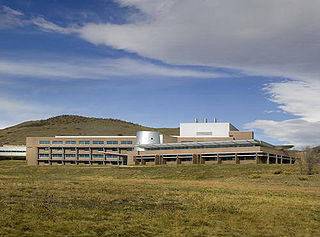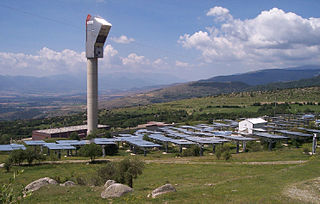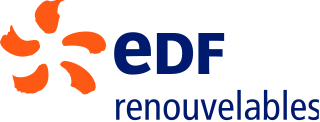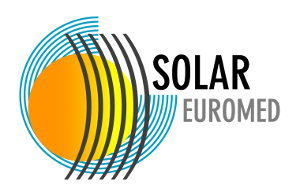
The National Renewable Energy Laboratory (NREL) in the US specializes in the research and development of renewable energy, energy efficiency, energy systems integration, and sustainable transportation. NREL is a federally funded research and development center sponsored by the Department of Energy and operated by the Alliance for Sustainable Energy, a joint venture between MRIGlobal and Battelle. Located in Golden, Colorado, NREL is home to the National Center for Photovoltaics, the National Bioenergy Center, and the National Wind Technology Center.

Air Liquide S.A. is a French multinational company which supplies industrial gases and services to various industries including medical, chemical and electronic manufacturers. Founded in 1902, after Linde it is the second largest supplier of industrial gases by revenues and has operations in over 70 countries. It has headquarters at the 7th arrondissement of Paris. Air Liquide owned the patent for Aqua-Lung until it expired.

The THEMIS solar power tower is a research and development centre focused on solar energy. It is located near the village of Targasonne, in the department of Pyrénées-Orientales, south of France, 3 kilometres from the world's largest solar furnace in Odeillo.
The Commissariat à l'Energie Solaire (ComES) was the French solar energy authority that existed from 1978 to 1982. The a public scientific and industrial entity, was set up in 1978 to promote a comprehensive energy policy based on energy savings, on efficient energy management, and on renewable sources of energy. It was supervised by the Ministry for Industry and by the Ministry for Research.
China Concepts Stock is a set of stock of companies whose assets or earnings have significant activities in mainland China. The People's Republic of China is undergoing major financial transformation, and many leading mainland-based companies have chosen to list themselves overseas to gain access to foreign investor capital. Currently, there are China Concepts Stocks listed on several major stock exchanges around the globe, including the Hong Kong Stock Exchange (HKEx), Singapore Exchange (SGX), New York Stock Exchange (NYSE), NASDAQ, NYSE MKT, London Stock Exchange (LSE), Euronext, and the Tokyo Stock Exchange (TSE).

Energy in Belgium describes energy and electricity production, consumption and import in Belgium.

EDF Renewables is a wholly owned subsidiary of the French utility EDF Group, specializing in renewable energy production. As an integrated operator, the Group develops and finances the construction of renewable energy facilities, and manages operations and maintenance for its own account and for third parties.

Solar Euromed is a high technology group based in France specialized in concentrated solar power technology, in activity from 2007 to 2016.

Alpiq is an internationally active energy group headquartered in Lausanne, Switzerland. The company was established in 2009 after the merger of Atel Holding AG and EOS S.A..

Primary energy consumption in Spain in 2020 was mainly composed of fossil sources. The largest sources are petroleum (42.3%), natural gas (19.8%) and coal (11.6%). The remaining 26.3% is accounted for by nuclear energy (12%) and different renewable energy sources (14.3%). Domestic production of primary energy includes nuclear (44.8%), solar, wind and geothermal (22.4%), biomass and waste (21.1%), hydropower (7.2%) and fossil (4.5%).
Solar power in France including overseas territories reached an installed capacity figure of 11.2 GW in 2020, and rose further to 17.1 GW at the end of 2022. Government plans announced in 2022 foresee solar PV capacity in France rising to 100 GW by 2050.

Energy in the U.S. state of Hawaii is produced from a mixture of fossil fuel and renewable resources. Producing energy is complicated by the state's isolated location and lack of fossil fuel resources. The state relies heavily on imports of petroleum; Hawaii has the highest share of petroleum use in the United States, with 67% of electricity generation in the state coming from petroleum in 2023, compared to less than 1% nationally.
Under its commitment to the EU renewable energy directive of 2009, France has a target of producing 23% of its total energy needs from renewable energy by 2020. This figure breaks down to renewable energy providing 33% of energy used in the heating and cooling sector, 27% of the electricity sector and 10.5% in the transport sector. By the end of 2014, 14.3% of France's total energy requirements came from renewable energy, a rise from 9.6% in 2005.
H.M. Rawat Corporate, was established in 1959 and trades in the IOI with sub offices overseas. Based in Port-Louis, the company engages in the import of luxury and general goods, machinery, fast food, catering, hotel, agriculture and brand mobile phones.
Renewable energy in Greece accounted for 29 percent of its electricity from renewable sources in 2021. By 2030, renewables are expected to have a capacity of 28GW, and exceed 61 percent of Greece's electricity consumption. This is a significant increase from 8% of the country's total energy consumption in 2008. By 2022, Greece occasionally reached 100% renewables for a few hours. The target for 2050 is a capacity of 65GW.
Masen, the Moroccan Agency for Sustainable Energy, is a privately owned Moroccan company with public funding. It was created in 2010 to lead the Moroccan solar project to generate electricity from solar power by installing a minimum capacity of 2,000 MW by 2020.

California produces more renewable energy than any other state in the United States except Texas. In 2018, California ranked first in the nation as a producer of electricity from solar, geothermal, and biomass resources and fourth in the nation in conventional hydroelectric power generation. As of 2017, over half of the electricity (52.7%) produced was from renewable sources.
The Ségou Solar Power Station is a planned 33 MW (44,000 hp) solar power plant in Mali. The power station is in the development stage, under concessional terms by the company Ségou Solaire, a subsidiary of Scatec, a Norwegian conglomerate, under a public private partnership (PPP) arrangement.

The energy sector in Mayotte is mainly oriented towards the consumption of electricity based on fossil fuels; renewable energies are currently underdeveloped for the moment, and there is no export of fossil fuels.
Groupe Dubreuil is a diversified family holding company, including Air Caraïbes and French Bee.










